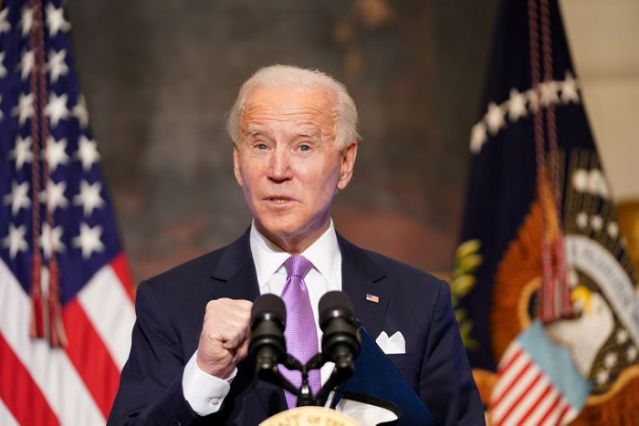
(Reuters) – President Joe Biden on Tuesday issued a firm call to heal America’s racial divide, taking several steps and promising more to confront racism and inequality that he said has plagued the United States for far too long.
Racial tensions simmered during the turbulent four-year presidency of Donald Trump and in issuing several executive orders, Biden noted that the Jan. 6 siege of the U.S. Capitol by Trump supporters was carried out by “thugs, insurrectionists, political extremists and white supremacists.”
But Biden said he believes the vast majority of Americans believe in equality.
“We’ve never fully lived up to the founding principles of this nation – to state the obvious – that all people are created equal and have a right to be treated equally throughout their lives,” Biden said in remarks at the White House. “And it’s time to act now, not only because it’s the right thing to do, but because if we do we’ll all be better off for it.”
Biden took executive action on four fronts: curbing the U.S. government’s use of private prisons, bolstering anti-discrimination enforcement in housing, underscoring a commitment to Native American tribal sovereignty and condemning discrimination against Asian Americans and Americans of Pacific Island descent he said has risen during the COVID-19 pandemic.
The Democratic president has sought to roll back some of the policies of his Republican predecessor and deliver on racial justice reforms he promised during the election campaign.
Biden and other critics accused Trump of pursuing policies built around “white grievance” in a nation where the white population is declining by percentage.
But Biden drew criticism from some Republicans when he used his inaugural address last week to decry white supremacy and political extremism.“If you read his speech and listen to it carefully, much of it is thinly veiled innuendo calling us white supremacists, calling us racists, calling us every name in the book,” U.S. Senator Rand Paul told Fox News last week.
Black voters proved essential to Biden first in winning his party’s presidential nomination and then in defeating Trump in the Nov. 3 election.
The United States, still struggling with the legacy of slavery, was rocked by protests against racism and police brutality in many cities last year in response to incidents including the death of Black man George Floyd in Minneapolis police custody in May 2020.
Trump condemned those protests and attempted to use them to stoke fear and unease among voters during the presidential campaign.
On the day he took office last week, Biden signed an executive order establishing a government-wide initiative to address racial inequity and systemic racism in federal policies, laws and programs.
Biden drew criticism from some Republicans when he used his inaugural address to decry white supremacy and political extremism.“If you read his speech and listen to it carefully, much of it is thinly veiled innuendo calling us white supremacists, calling us racists, calling us every name in the book,” Senator Rand Paul told Fox News last week.





